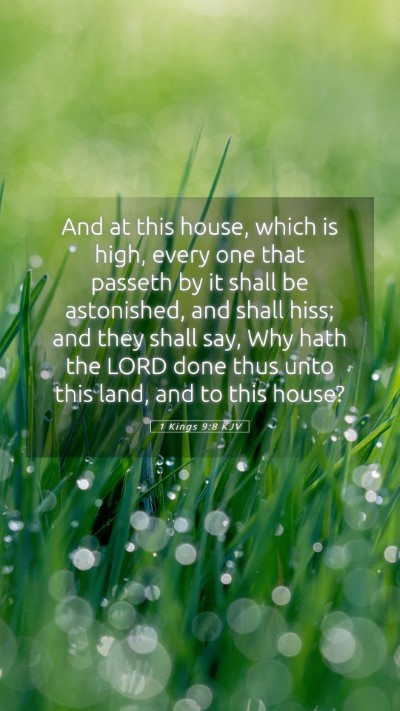Bible Verse Commentary: 1 Kings 9:8
Bible Verse: 1 Kings 9:8 - "And at this house, which is high, every one that passeth by it shall be astonished, and shall hiss; and they shall say, Why hath the LORD done thus unto this land, and to this house?"
Overview: This verse reflects on the consequences of disobedience and the resulting destruction that will astonish onlookers and raise questions about God's justice and purposes. The high house, referring to the temple built by Solomon, serves as a central focus for God's people and their covenant relationship with Him.
Summary of Insights
The following sections provide insights drawn from various public domain commentaries, specifically focusing on the interpretations by Matthew Henry, Albert Barnes, and Adam Clarke.
Historical Context
Matthew Henry's Commentary: Henry emphasizes the significance of the temple as a symbol of God's presence among His people. He notes that the original awe and reverence that the temple inspired in the hearts of the Israelites would be replaced by astonishment at its downfall due to the people's sin. The temple, once a center of worship and divine favor, becomes a source of derision and questions about God's fidelity to His promises.
Theological Implications
Albert Barnes' Notes: Barnes elaborates that this verse serves as a warning to future generations about the implications of turning away from God. The astonishment of passersby reflects their observation of the stark contrast between the temple’s former glory and its present desolation. This serves to remind believers of the seriousness of their covenant with God and the potential consequences of unfaithfulness.
Moral Lessons
Adam Clarke's Commentary: Clarke notes the moral lesson conveyed through this verse. It is designed to elicit reflection upon one's relationship with God. When the temple stands in ruins, it raises profound questions regarding divine justice and mercy, prompting individuals to examine their own spiritual state. The 'hissing' mentioned indicates contempt and disbelief, which serves as a stark reminder of the repercussions of sin and neglecting one's responsibilities to God.
Application of the Verse
This verse encourages individuals to think critically about their own lives and spiritual journeys. The state of the temple correlates with one's personal faith—whether one dwells in blessings or faces consequences due to disobedience. It beckons the faithful to remain steadfast in their commitment to God to avoid similar misfortune.
Cross References
- 2 Chronicles 7:20 - The consequences of turning away from God.
- Jeremiah 22:8-9 - The nations’ astonishment at the downfall of Jerusalem.
- Matthew 24:1-2 - Jesus’ prophecy regarding the destruction of the temple.
Conclusion
The message of 1 Kings 9:8 transcends its immediate historical context, offering timeless lessons concerning God's faithfulness and the dire consequences of human disobedience. As Bible study groups and individuals seek to delve deeper into Scripture, the insights from public domain commentaries provide valuable perspectives for understanding this verse's significance in both ancient and contemporary contexts.
Related Bible Study Resources
- Online Bible study tools for deeper analysis.
- Bible study guides to enhance scripture understanding.
- Discussion topics for Bible study groups focusing on covenant and obedience.
Further Study Suggestions
For those desiring a more in-depth exploration of this passage, consider engaging with the broader historical context of the temple's construction and eventual destruction. Explore themes of covenant faithfulness and the implications of disobedience through various Bible study lessons, ensuring a holistic understanding of the spiritual lessons embedded in this verse.
This verse and its interpretations encourage readers to reflect upon the meaning of their faith amidst trials and serve as a reminder of the importance of nurturing a devoted relationship with God.


